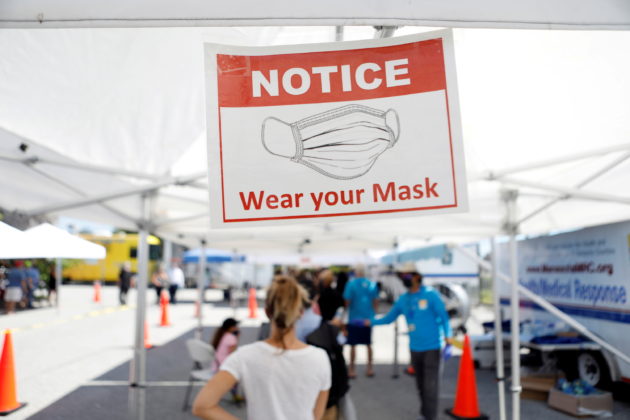By Roshan Abraham and Maria Caspani
(Reuters) -The United States hit a six-month high for new COVID cases with over 100,000 infections reported on Wednesday, according to a Reuters tally, as the Delta variant ravages areas where people did not get vaccinated.
The country is reporting over 94,819 cases on a seven-day average, a five-fold increase in less than a month, Reuters data through Wednesday showed. The seven-day average provides the most accurate picture of how fast cases are rising since some states only report infections once a week or only on weekdays.
Seven U.S. states with the lowest COVID-19 vaccination rates – Florida, Texas, Missouri, Arkansas, Louisiana, Alabama and Mississippi – account for half of the country’s new cases and hospitalizations in the last week, White House COVID-19 coordinator Jeff Zients told reporters on Thursday.
In the coming weeks, cases could double to 200,000 per day due to the highly contagious Delta variant, said top U.S. infectious disease expert Dr. Anthony Fauci on Wednesday.
“If another one comes along that has an equally high capability of transmitting but also is much more severe, then we could really be in trouble,” Fauci said in an interview with McClatchy. “People who are not getting vaccinated mistakenly think it’s only about them. But it isn’t. It’s about everybody else, also.”
To combat the Delta surge, the United States plans to give booster shots to Americans with compromised immune systems, top U.S. infectious disease expert Dr. Anthony Fauci said Thursday.
The United States is joining Germany, France and Israel in giving booster shots, ignoring a plea by the World Health Organization to hold off until more people around the world can get their first shot.
FLORIDA SURGE
Southern states, which have some of the nation’s lowest vaccination rates, are reporting the most COVID-19 cases and hospitalizations. Florida, Texas and Louisiana were reporting the highest total number of new cases in the region over the last week, according to a Reuters analysis.
Florida, which has emerged as the nationwide hotbed of new infections, set yet another grim hospitalization record on Thursday with 12,373 confirmed COVID-19 patients in its hospitals, according to data from the U.S. Department of Health and Human Services (HHS).
More children are hospitalized with the virus in Florida than in any other U.S. state, HHS data shows.
“23% of new COVID hospitalizations in the U.S are in Florida, and their hospitals are being overwhelmed again,” White House Press Secretary Jen Psaki said on Wednesday. Psaki urged the state’s governor, Republican Ron DeSantis, to “join us in this fight” after DeSantis accused Biden of singling out his state.
Louisiana and Arkansas are also grappling with record or near-record numbers of coronavirus patients occupying beds, according to a Reuters tally.
President Joe Biden on Tuesday urged Republican leaders in Florida and Texas – home to roughly a third of all new U.S. COVID-19 cases – to follow public health guidelines on the pandemic or “get out of the way.”
To try to halt the spread of the virus, New York City will require proof of vaccination at restaurants, gyms and other businesses.
Some private companies are also mandating vaccines for employees and customers.
As Delta spreads, some companies are delaying plans for workers to return to the office. Amazon.com, which had originally set Sept. 7 as the comeback date, on Thursday said it would not expect U.S. corporate employees to return to the office until next year, according to an internal note seen by Reuters.
(Reporting by Roshan Abraham in Bengaluru and Maria Caspani in New York; Additional reporting by Jeff Mason, Susan Heavey, Carl O’Donnell and Trevor Hunnicutt; Editing by Lisa Shumaker)
 FILE PHOTO: Patients wait in line to get a swab test at a COVID-19 mobile testing site hosted by the Manatee County Florida Department of Health in Palmetto, Florida, U.S., August 2, 2021. REUTERS/Octavio Jones/File Photo
FILE PHOTO: Patients wait in line to get a swab test at a COVID-19 mobile testing site hosted by the Manatee County Florida Department of Health in Palmetto, Florida, U.S., August 2, 2021. REUTERS/Octavio Jones/File Photo



